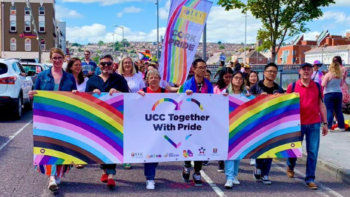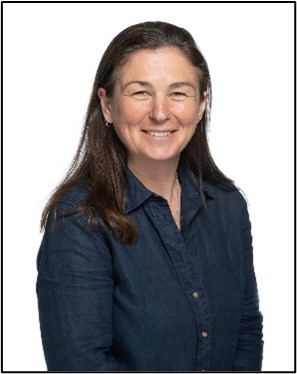
Consensual same-sex sexual acts are a criminal offence in 67 (out of 193) UN member states.
The death penalty is the legally prescribed punishment for consensual same-sex sexual acts in 6 UN member states (and possibly 5 others).
Only 28 UN member states recognise same-sex marriage.
There has been a sharp rise in anti-LGBT+ rhetoric from politicians and other leaders (e.g. ‘LGBT-free zones’; banning of Pride marches etc) fuelling a wave of violence and LGBT+ rights regressions
 It is hard to
It is hard to  believe that we are still discussing statistics such as these in 2023. These statistics formed part of a superb talk given by UCC’s Dr Diarmuid Scully and Ms. Mary O Rourke, who are co-chairs of UCC’ LGBT+ Staff Network. Diarmuid is a Lecturer at the School of History and Mary works at the Office of the Vice President for Learning & Teaching. We are very grateful to them for accepting an invitation to join us for the Praxis Summer School. The staff network is involved with the following work:
believe that we are still discussing statistics such as these in 2023. These statistics formed part of a superb talk given by UCC’s Dr Diarmuid Scully and Ms. Mary O Rourke, who are co-chairs of UCC’ LGBT+ Staff Network. Diarmuid is a Lecturer at the School of History and Mary works at the Office of the Vice President for Learning & Teaching. We are very grateful to them for accepting an invitation to join us for the Praxis Summer School. The staff network is involved with the following work:
Raising visibility of LGBT+ community
Organising educational and other events
Lobbying for policy & practice changes to secure inclusion
Networking in solidarity with ally colleagues and groups
At the moment some of the issues the network are addressing in Ireland are:
1.Ending so-called ‘conversion therapy’
2.Inclusive curriculum and RSE programme in education sectors
3.Introduction of hate crime legislation
Mary and Diarmuid gave a talk to all participants in the morning. They focused on LGBT+ rights and issues in Ireland and internationally. They provided a number of hopeful case studies illustrating how change happens. For instance how the town of Fermoy in Co Cork cut ties with its Polish twin town, Nowa Deba, over a motion opposing “LGBT ideology”.
The full story can be found on the Irish Examiner Newspaper on 20th October:
https://www.rte.ie/news/munster/2020/1020/1172832-poland-town-fermoy/
All six councillors in Fermoy voted to sever the town’s 14-year relationship with the eastern Polish town, which had included exchange visits and cultural events, said Councillor Noel McCarthy who proposed the vote.
You can browse through Mary and Diarmuid’s excellent presentation here:
2023_GDESummer School_LGBT+ rights
Afternoon Workshop
In the afternoon they ran a workshop with some of the workshop participants.
Here is an account of the workshop from some of the participants:
Taragh OSullivan, Ronan Keohane, Ella Barrett, Carly ODonaghue, Mary Brosnan
What is the theme?
The theme we discussed was LGBT+ history, LGBT+ rights, LGBT+ campus initiatives, intersectionality within the LGBT+ community, present-day LGBT+ issues along with the extent to which the United Nations Sustainable Development Goals are inclusive towards LGBT+ people and ensure the protections of their rights or not. We were then encouraged to formulate our own ideas about how this lack of inclusivity can be resolved through our own actions. This took place between 2pm and 5pm in Nano Nagle place, Douglas Street, Cork City. There were 3 main presenters which were 2 members of the UCC LGBT staff network and the UCC Graduate Attributes Programme Manager.
What are the classroom methodologies?
In the classroom there were a wide variety of methodologies utilised. Examples include a table quiz, PowerPoint presentation, pair work, a class discussion and action planning. We were firstly given an informal table quiz in groups of 2 which tested the extent to which we knew about LGBT+ history. The scores were calculated and the highest scoring group of participants were given t-shirts for their efforts.
After the quiz we were shown a PowerPoint presentation which discussed LGBT+ history and the unique set of struggles that LGBT+ people face. We discussed the struggles facing LGBT+ communities in the past and the present with the rise of the alt-right. We further discussed intersectionality in the LGBT+ community and ways in which different members of the community face different sets of struggles and differing discrimination.
After discussing the intersectionality of the LGBT+ community, we then were once again split into groups of two and given copies of the United Nations Sustainable Development Goals and were told to investigate them and their inclusivity levels. After reading article 10.2, we discovered that LGBT+ people were not specifically protected by the Sustainable development goals.
Afterwards, we were encouraged to formulate a detailed action plan towards the various organisations across Ireland which implement UN SDG’s in their operations to combat this exclusion. After drafting a short plan we were returned to the main conference hall where we became acquainted with the activities and ideas of the other 2 groups involved in the PRAXIS summer programme.
What were some of the skills we learned about?
The skills that were required today at the LGBT+ talk were:
Open-mindedness:
We were open to accepting and understanding different perspectives, experiences and identities
while also challenging our own preconceptions.
Empathy:
Understanding the challenges that the LGBT+ community face regarding Sustainable
Development Goals especially goal 10.2 where gender identity or sexual orientation wasn’t
mentioned at all. Show empathy and compassion for people’s experiences is supportive rather
than being judgemental.
Active Listening:
We showed active listening while working in pairs and listened to each other viewpoints on the
topics we were given to discuss. We listened to the speakers while educating the group about the
Stonewall Riot in New York and other challenges faced by the LGBT+ community.
Knowledge:
We learnt about the different colours on the progress Pride rainbow flag and some of its history
through the quiz we had to do in pairs at the beginning of the session. Learning about all aspects
of the LGBT+ community enhances and grows our knowledge and helps integrate a positive and
inclusive society that serves all.
Respect:
By listening and understanding the importance of using the appropriate terminology and
respectful language that is used in the LGBT+ community. Staying updated on the evolving
language understanding, especially regarding the usage of correct pronouns.
Self-reflection/Critical Thinking:
Reflecting on our own views and opinions can lead us to see our attitudes, and assumptions
about sexual orientation, gender identity and biases. We can unlearn anything that may be seen
to be harmful towards others. It is a continuous journey of self-reflection.
Resources:
We learnt that there are many organisations that have guidance, information, and support on
various subjects within the LGBT+ community and regardless of our own sexual orientation we
should all be made aware of these supports.
Being an Ally:
We learnt about the importance of being an ally. By learning how to be an effective ally within
the LGBT+ community we become advocates and can use our voice if we witness any type of
discrimination. Being allies by wearing a symbol of solidarity can also show that people within
the LGBT+ community are safe with you.
Values developed from the PRAXIS week LGBT+ talk on Thursday
Today was an incredible opportunity for us to explore and discuss many issues which face
members of the LGBTQ+ community both in an Irish context and an international one. In doing
so, we employed a variety of core values which can be taken outside a classroom environment
and applied into real life situations.
One of these many values is justice. Fundamentally, our task was to produce a possible plan to
ensure justice for LGBTQ+ people as they are neglected in the consideration of the sustainable
development goals (SDGs).
“Pride is a protest” came to mind as we may still be oblivious to a myriad of discriminations that are not being tackled in the mainstream media. This seminar and workshop opened our eyes to the ongoing struggle for queer people and therefore created a drive for justice. Furthermore, respect and acceptance were vital in these conversations surrounding what is still a sensitive subject to many people.
While these discussions may feel awkward or uncomfortable, we were encouraged to ask any questions to gain better understanding of terms which may have been unfamiliar to us (ie. gender identity vs sexual orientation). At our core, it was essential to be respectful in our discourse and be welcoming to new ideas.
I had overwhelming respect for our speakers and their confidence in the discussion of LGBTQ+ rights and their ability to critically discuss the state of gay rights in Ireland specifically. Lastly, compassion excellently summarizes the fundamental value of unpacking social issues. We aim to relieve LGBTQ+ people of their disillusionment and we hope to ensure that their disregard will not be repeated in the next stage of the sustainable development goals. Compassion was clearly evident when we discussed several examples of struggle in the community in terms of coming out, seeking justice, equality and global recognition. I was personally moved by the hardships faced in a particular example where coming out never seemed like the safe option.
Reflection
During the Praxis Summer School 2023 the idea that the global reflects the local and vice versa was a thread that linked many ideas. When one looks at the experience of the Irish LGBTQ+ community, one learns about discrimination and the personal stories of lives lived in the shadows. This mirrors the global experience. It is also not the full story.
The 2015 referendum created what appeared to be a ‘honeymoon period’. Leo Varadkar issued a state apology in 2018 and 2021 brought in Hate Crime legislation. The Pride flag now flies over UCC and many public buildings. Our language is more engaged, respectful, reflective and inclusive Yet we learned that 20% of hate crimes reported in Ireland last year was related to homophobia. There is legal protection on paper but the reality is different.
How many same sex couples feel free to hold hands in Ireland? How many Irish holiday destinations welcome and facilitate LGBTQ+ tourists? Within Europe Pride marches have been cancelled for fear of violence. In 2020 Fermoy ended its twinning agreement with Nowa Deba in Poland over it being a ‘LGBTQ free zone’. This town is one of 80 Polish municipalities that declared themselves free of LGBTQ ideologies in 2019. The EU responded by cancelling twinning grants to these cities clearly demonstrating their support.
In Ireland there is a growing commitment of being an ‘ally’ to the LGBTQ community. One can wear the badge, march in solidarity, carry the Pride bag and fly the flag. Asking about what terminology and language is acceptable and encouraged. This tells someone that they are safe and valued by you. So much has changed in Ireland but there’s more to be done.
One in three students skip school because of their experience of homophobia. Do we have suitable changing facilities or toilets in our schools and colleges? Why do people feel that they have to ‘come out’ many times in their personal and professional lives? Are we shocked to learn that 69% of UCC students still hear homophobic remarks? How do we respond to this?
The group looked at the Sustainable Development Goals and in particular goal 10:2 and learnt that the LGBTQ community are excluded and that some countries would not sign up to the goals if the LGBTQ community were included. This is where the local needs to challenge the global and demand inclusion. The motto of SDGs is to ‘leave no one behind’ yet they are selective in who they bring with them.
To mark Pride Week June 2023, Taoiseach Leo Varadkar, Tánaiste Micheál Martin and Minister for Justice Helen Mc Entee met with LGBTQI+ and announced that ‘historical convictions for consensual sexual activity between men will be disregarded under new laws’. It was also announced that conversion therapy would be criminalised. ‘The Irish Government is committed to the promotion and protection of LGBTQI+ rights and we will work to better the lives of all in the community’ While l can go and buy my Pride t-shirts in Penny’s, the reality is that it isn’t all unicorns and rainbows for everyone. The work continues but the commitment to make it happen is there.
Many thanks to Mary O’Rourke and Dr. Diarmuid Scully whose wisdom, inclusion, vision and credibility honored those they spoke of.
In the afternoon they ran a workshop on LGBT+ rights.
